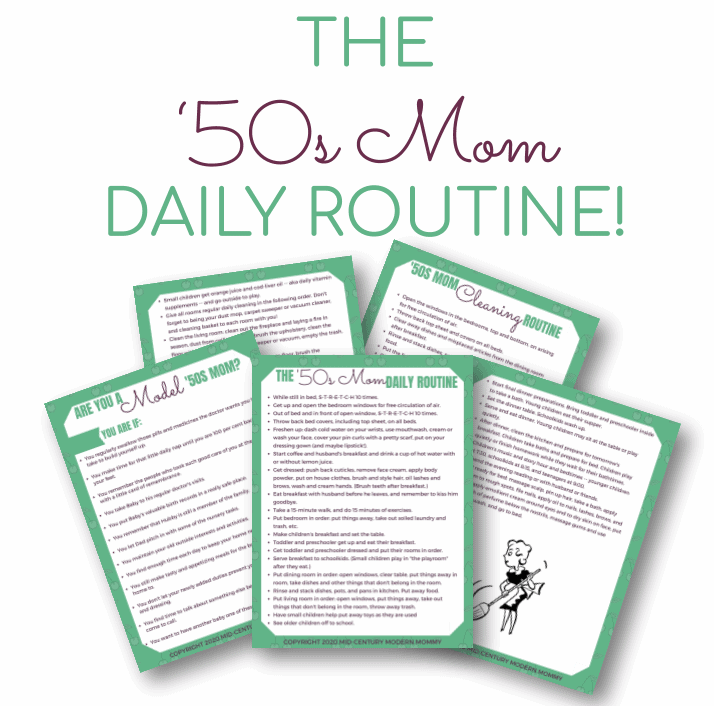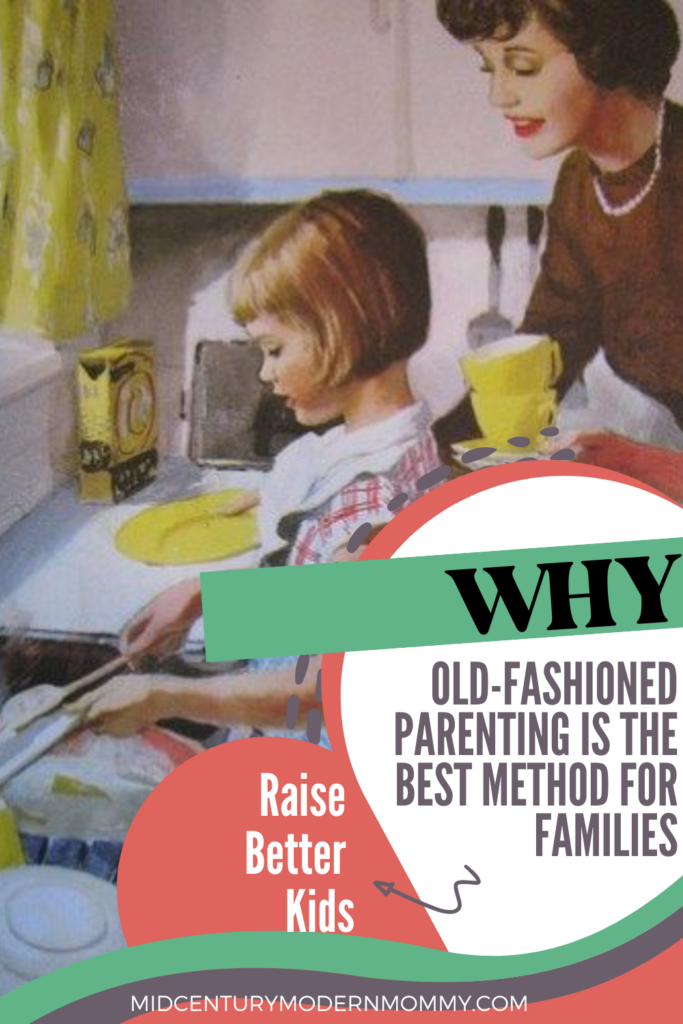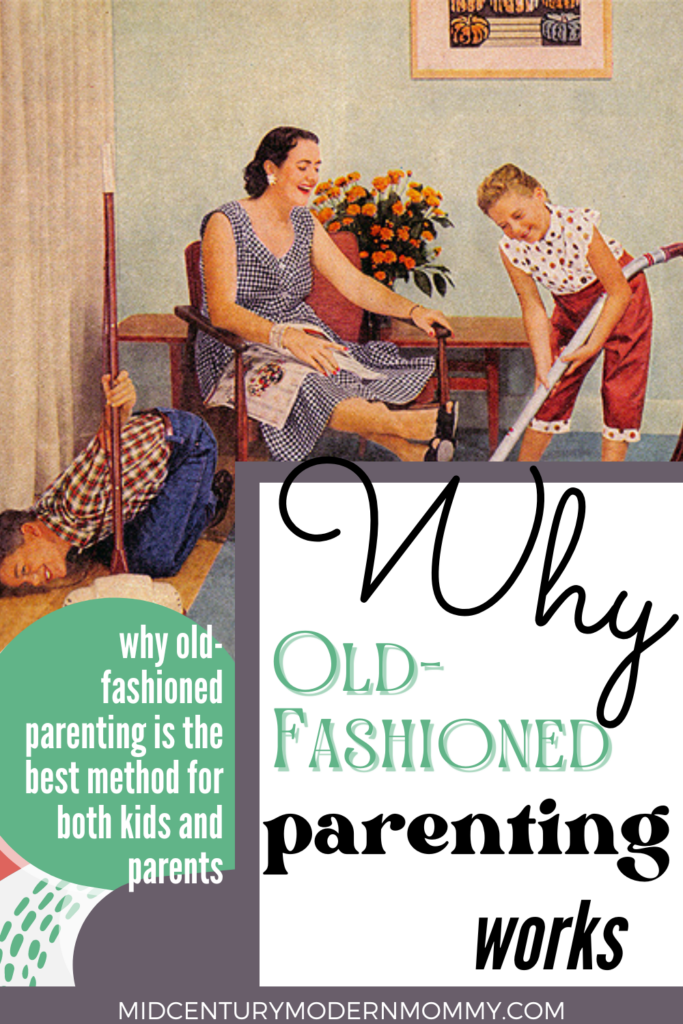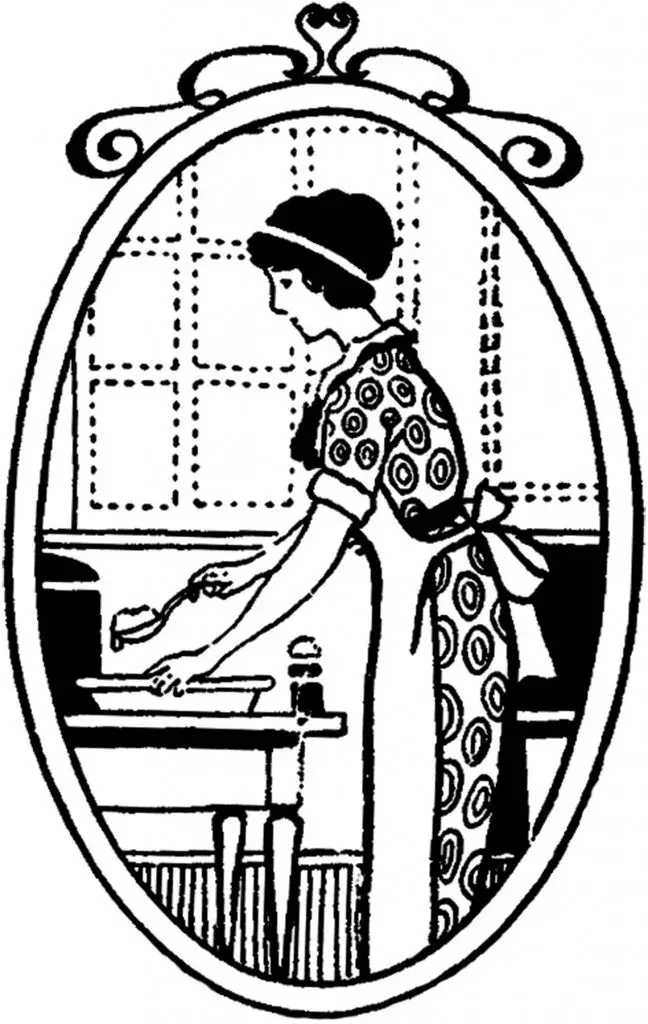Are you tired of modern parenting methods that just don’t seem to work? Are you looking for a better way to raise your kids? Look no further than the world of old-fashioned parenting. It’s time to revive the powerful techniques that have been proven effective for generations. According to the renowned parenting expert, John Rosemond, “Old-fashioned parenting is based on the idea that parents are in charge and that children are responsible for their own behavior.” So, if you’re ready to take back control and raise responsible, well-behaved kids, read on to discover old-fashioned parenting techniques that will improve your family life TODAY.

Get Our Mid-Century Mom Daily Routine FREE!
Powerful Old-Fashioned Parenting Techniques
Modern parenting methods may promise quick fixes and instant gratification, but they often fail to produce the desired outcomes.
Back in the day, our foremothers and forefathers knew that a child needed leadership from their parents first and foremost. Nowadays, parents are more concerned with having a “wonderful” relationship with their kids. But let me tell you, some things just have to wait!
Today’s advice for moms is all about orbiting around their children, making sure they’re happy and taken care of. But mid-century moms knew the importance of teaching their kids to stand on their own two feet and do for themselves and their family.
And today’s dads! They are told to be their kid’s best buddy, but yesterday’s dad knew that growing up and being a father came before being your kid’s friend. Being an adult should always be most important in your relationship with your child. They are not your custom-made buddy.
Back then, parents were married to each other and knew that their relationship had to be stronger than their relationships with their children. Nowadays, the parent-child relationship is stronger than the husband-wife relationship, and it’s no wonder why so many marriages fall apart after the kids leave the nest.
Nowadays, parents are lost in a sea of psycho-babble, making them feel emotionally and physically drained at the end of every day. It’s all too serious for them, and that’s just not the way to do it. Take child-rearing seriously, but not the children themselves. The former is essential to having a healthy relationship with your child, but the latter? That’s just self-oppression, turning parenting into a joyless chore.
Modern Resources for Old-Fashioned Parenting
This post contains affiliate links. If you click a link and make a purchase, I may receive, at no additional cost to you, a small commission. Find out more on my Disclosures page, and thank you so much for your support!
My number 1 recommendation for vintage parenting in the modern world is Dr. John Rosemond, especially his books Grandma Was Right, The Well-Behaved Child, and The New Six-Point Plan. There are some other books, too, but these 2 are the place to start.
Another book I recommend is Raising Godly Tomatoes. I DO NOT advocate for methods of corporal punishment, but I do recommend her suggestions for keeping your children with you and building relationships, and she includes the techniques that she replaces corporal punishment with as a recommendation for mothers living in places like Sweden, where spanking is illegal. This book has definite overtones of the Pearl’s To Train Up a Child, but again, I recommend avoiding corporal punishment and finding alternatives, because government overreach and medical kidnapping are a thing right now.

Discipline is more important than understanding
Dr. John Rosemond argues that parental discipline is more important than parental understanding in raising children. He writes:
“Understanding is important, but it is not enough. Children need to know that their parents are in charge and that they will be held accountable for their actions. Without discipline, children will quickly learn that they can get away with anything, and they will become unruly and disrespectful.”
Rosemond goes on to say that discipline should be fair, consistent, and predictable. He also argues that it is important to avoid power struggles with children. Instead, parents should focus on teaching their children self-control and responsibility.
Rosemond’s views on discipline are based on his belief that children need to learn self-discipline in order to become successful adults. He argues that parents who are too understanding with their children will only create children who are spoiled and entitled.
There is a growing body of research that supports Rosemond’s views on discipline. Studies have shown that children who are raised with clear expectations and consistent discipline are more likely to be successful in school, have healthy relationships, and avoid criminal behavior.
Parents who are clear about their expectations, consistent in their discipline, and avoid power struggles with their children are more likely to raise children who are successful and well-adjusted.
Discipline should be immediate and consistent
When a child misbehaves, it’s important to discipline them right away. Children need to learn that their actions have consequences because that’s the way life works in the real world as they become adults.
The discipline should also be consistent, so the child knows what to expect. If you’re not consistent with your discipline, your children will never learn.
So, what does consistency mean? It means setting clear expectations and rules, and then following through with them. It means being fair and impartial. And it means being firm, but fair.
In addition to consequences, it is also important to use positive reinforcement when children behave appropriately. This means letting them know when they have gone above and beyond. It is important not to praise for meeting a bare minimum, but exemplary conduct should always be noticed and specifically called out.
Parents should be in charge, not children
Children should not be the ones making the rules. Parents should be in charge and set the boundaries. Being authoritarian or overly strict does not work for raising wise, helpful and respectful adults, but being firm and decisive and kind does.
Parenting is about teaching your children how to be happy. It’s about teaching them how to make good choices, how to be responsible, and how to be successful in life.
And one of the most important things you can teach your children is that they don’t make the rules. You do. As a parent, it’s your job to set the boundaries and expectations for your children. It’s your job to teach them right from wrong. And it’s your job to make sure they grow up to be productive members of society.
So, if you’re a parent, don’t be afraid to be firm. Don’t be afraid to set boundaries. And don’t be afraid to say no. Because your children will thank you for it in the long run.
Respect for authority should be taught
Respect for authority is a key value in old-fashioned parenting. Children should learn to respect not only their parents but also teachers, police officers, and other authority figures. This doesn’t mean blindly obeying authority – you should pride yourself on raising children who will NOT blindly follow an evil command – but it does mean treating others with respect and courtesy.
Parents Have a Responsibility to Raise Responsible Adults
Responsibility is another key value in old-fashioned parenting. Children should learn to take responsibility for their actions and their belongings. This means teaching them to clean up after themselves, keep track of their belongings, and be accountable for their mistakes. For example, if your child forgets their homework, they should take responsibility for it and suffer the consequences.
Children should learn to be independent
It’s important for children to learn how to do things for themselves, and how to take care of themselves. This will help them to be more confident and self-sufficient in the future.
So, how can you teach your children to be independent? Here are a few tips:
- Let them do things for themselves. Don’t be afraid to let your children make mistakes. It’s how they learn.
- Don’t always rescue them. If your child falls down, don’t always run to help them up. Let them try to do it themselves.
- Encourage them to be independent. Talk to your children about the importance of being independent. Tell them that you believe in them, and that you know they can do it.
Children should learn to work hard
In old-fashioned parenting, children are taught the value of hard work. Children benefit from chores and responsibilities around the house, even at a young age.
Chores help kids learn responsibility, self-reliance, and cooperation. They help kids develop a sense of accomplishment and pride in their work. And, chores help kids learn valuable life skills that they will need as adults.
Here are some specific benefits of giving kids chores:
- Responsibility: Chores teach kids that they are responsible for their own actions and that they need to contribute to the household. This is an important life skill that will help them succeed in school, in their careers, and in their personal lives.
- Self-reliance: Chores help kids learn how to take care of themselves and their belongings. This includes things like doing laundry, cleaning their rooms, and making their beds. As kids get older, they can learn more complex tasks like cooking, grocery shopping, and doing yard work.
- Cooperation: Chores teach kids how to work together with others. This is an important skill for kids to learn in order to get along with their siblings, their friends, and their classmates.
- Accomplishment: When kids complete a chore, they feel a sense of accomplishment. This can boost their self-esteem and make them feel good about themselves.
- Life skills: Chores teach kids valuable life skills that they will need as adults. These skills include things like time management, organization, and problem-solving.
Children should learn to entertain themselves
Old-fashioned parenting emphasizes the importance of children learning to entertain themselves. This means providing them with opportunities for independent play and limiting screen time. For example, encourage your child to read a book, play a board game, or go outside to meet some friends.
Old-fashioned parenting provides children with many opportunities for unstructured play and exploration. Older infants and young children are placed in indoor and outdoor playpens to keep them safe and left to play independently while Mother does her work. Toys are kept to a minimum during the early stages of development, which allows the creative faculties to expand.

Children Should Be Home-Oriented
This goes back to respect for authority and also to the idea that we are raising adults, not parenting children.
Children should be family-oriented rather than peer-oriented because family is the foundation of a child’s life.
- Family provides children with a sense of security and stability. They know that they have a place to belong. Belonging to a group with high standards gives them a reason to strive for excellence and to make a difference in the world.
- Family helps children develop their identity. They learn about their culture, their heritage, and their values from their family. This helps them to develop a sense of who they are and where they come from.
- Family teaches children about love, respect, and responsibility. These are essential skills for an adult. As an adult, you will need to respect authority, practice self-control and appropriate social skills, and be responsible for yourself and others.
Parents should focus on raising adults rather than parenting children
Parents who focus on raising happy children are doing their children a disservice. Happiness is important, but it is not the most important thing. What is more important is that children learn how to be responsible adults. Children who are not taught how to be responsible will struggle in life. They will be more likely to make bad decisions, get into trouble, and have difficulty finding and keeping a job.
Parents should prioritize family time
Old-fashioned parenting emphasizes the importance of eating dinner together, an activity that strengthens roles, rituals, and relationships within the family. It teaches children the value of family and helps strengthen family bonds.
Another important family activity is celebrating traditions. Things like holidays and birthdays should be accompanied by traditions and rituals that are built around the family. That doesn’t mean that a birthday party or Christmas morning should be used as a platform for selfish, mean-spirited, or narcissistic behavior. Parents need to lead children into the understanding that celebrations are a time to be selfless, generous, and grateful, by modeling – and by requiring that children do the same or face the consequences.
Screens Don’t Help
Screen-based devices are bad for children. They can lead to problems with attention, sleep, and behavior. They can also contribute to obesity and other health problems.
Dr. Russell Barkley, a leading expert on ADHD, has said that screen-based devices can be “toxic” for children with ADHD. He has found that children with ADHD who use screen-based devices for more than two hours a day are more likely to have problems with attention, impulsivity, and hyperactivity.
Marie Winn’s book, The Plug-In Drug, was first published in 1977, but it is still relevant today. In her book, Winn argues that television is a “plug-in drug” that can be addictive for children. She cites research that shows that children who watch too much television are more likely to have problems with attention, learning, and behavior. They are also more likely to be overweight and obese. When children are constantly watching television, they are not using their own minds to create their own stories and adventures. They are simply passive consumers of someone else’s content. This is especially a problem with social media available.
It is important to limit, or better yet eliminate, the amount of time that children spend on screen-based devices. Instead, encourage them to play outside, read books, and use their imaginations. These are the activities that will help them develop into healthy, well-rounded adults. If you are really struggling with this, then there is a great book, The Out-Of-Sync Child Has Fun, that can help.
Why You Should Be An Old-Fashioned Parent
Children who are raised with clear expectations and consistent discipline are more likely to be successful in school, have healthy relationships, and avoid criminal behavior. They are also more likely to be happy and well-adjusted adults.
Old-fashioned methods mean spending more time following through with discipline, setting clear expectations, and enforcing those expectations consistently. It also means teaching children how to be responsible, respectful, and independent. But it also means less time entertaining your children and coping with childish adults.
Your children will benefit from having old-fashioned parents as much as you do.






100% agree!
When we get away from what made us great we fall into a deeper pit. Thank you for this reminder when it comes to parenting.